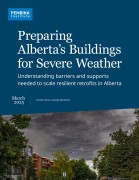The Dutch Energiesprong program has retrofitted over 2,000 dwellings to net-zero energy, with another 9,000 or so units contracted. This market development model brings together social housing providers, construction companies, regulators, and the financial sector to create retrofit products that meet the demands of an aggregated pool of buildings.
B.C.’s affordable housing stock is in need of repairs, and thus offers an opportunity for such an aggregated approach. Over half of the stock was built before 1990, and most of the stock has a higher-than-average energy use intensity. Around 38,000 units of social housing apartments and townhouses were built before 2000; their average energy use intensity is almost twice the provincial average.
Together, these apartments and townhouses use 2,700 terajoules (TJ) of energy per year and emit 50,000 to 70,000 tonnes of carbon dioxide equivalent (CO2e) per year; accelerating their conversion to low-energy, low-carbon units offers significant opportunities for greenhouse gas (GHG) emission reductions.
This backgrounder was provided to participants of the Pembina Institute’s Affordable Housing Renewal: Retrofits at Scale workshop. We summarize:
- The scale and pace of retrofits needed to meet climate targets in B.C.
- The approach taken by the Dutch Energiesprong program, a model that could accelerate development of turnkey retrofit solutions in Canada
- The current composition of B.C.’s affordable housing stock, including types of affordable housing, building types, and vintage
- A first-order estimate of the number of social housing units that could be pooled in a first “bulk service” proposal, and of the potential resulting energy and GHG reductions
- Opportunities and challenges posed by the expiry of operating agreements between housing societies and the provincial government
- A review of how operations and maintenance costs and retrofits costs are currently shared between housing societies, tenants, and BC Housing, and regulatory constraints affecting capacity to recoup energy cost savings accrued by the tenant








